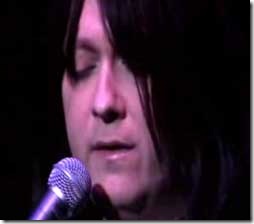A morning Psalm:
Thy people shall be willing in the day of thy power, in the beauties of holiness from the womb of the morning: thou hast the dew of thy youth.
Brats in church, we were, making great sport with the AV’s thee’s and thou’s, and floweth’s and groweth’s. But now there are moments when the beauty of the King James language breaks me open. Its music–its own reason for reading.
All the emaciated translations not only trade away the music and rhythm but they jettison a wealth of nuances as well. Consider this New English version of the above reading: "When you go to war, your people will serve you willingly. You are arrayed in holy garments, and your strength will be renewed each day like the morning dew." Not only is the "updated" translation deaf to cadence and lyricism, it literalizes (God as Holy Warrior) and so narrows the imaginative scope of other possible readings. Poetry transmogrified to the prosaic.
So I’ll throw my lot in with the seventeenth-century scholars—with this (I’m reminded by my wife) important caveat: Lyricism notwithstanding, the KJV, especially the Pauline letters and parts of the OT, has been used by misogynists and hyper-fundamentalists to subjugate and contain women, minorities, and progressive ideas. In this case, as you no doubt know if you’re a bible reader, some newer translations have been liberating.
But what catches me up in this morning’s Psalm is this notion: To will without willing—drawn in, unawares, by the elemental power of Beauty. This is not willing as in, chosen, assent to, risen to, noble triumph of the will, or what have you, but willing as if it wasn’t your thought at all—not your call, no more so than cellular division—but a gut response to what is.
When Leonard Cohen prayed he would have some response to the beauty he saw around him he was stepping back to wait for something that was wild inside him to connect to the wild spirit of beauty itself. He wasn’t making application; he was hoping to be enlisted.
Cohen might say, wait here…
Set aside your art appreciation seminars, your tours of the Serengeti, and pray to be born into the morning of immediacy and innocence; pray for it daily, pray at dawn before the dew lifts.
Do not push down those things that push up inside your ribcage like speargrass and prick you open to the natural longing of loving others as thyself.
Discard your daydreams of being centre stage, courting the adulation that excludes. Instead pray for an invasion of the beauties of holiness.
Wait for the day of power—which is nothing other than the day of grace. But remember that there is no other day than today; a day wherein you already have the youth and strength of the first explosion.
Anthony singing Leonard Cohen’s, If it be your will, from I’m Your Man
Poetry Festival: I was at a reading by Lori Neilsen Glenn, the poet of the Lost Gospels. She autographed her book for me, then asked me if I was a poet. And I should have said (if I would have had my wits about me which I seldom do, being one who desires to be loved by everyone) that I try to follow T.S. Eliot’s advice that one should not have the ambition to be a poet, but rather the hope to write, one day, a poem.
Do you see how Elliot, too, knew about willing without willing?


Have I mentioned lately how much I enjoy this blog? 🙂
Delighted you do!